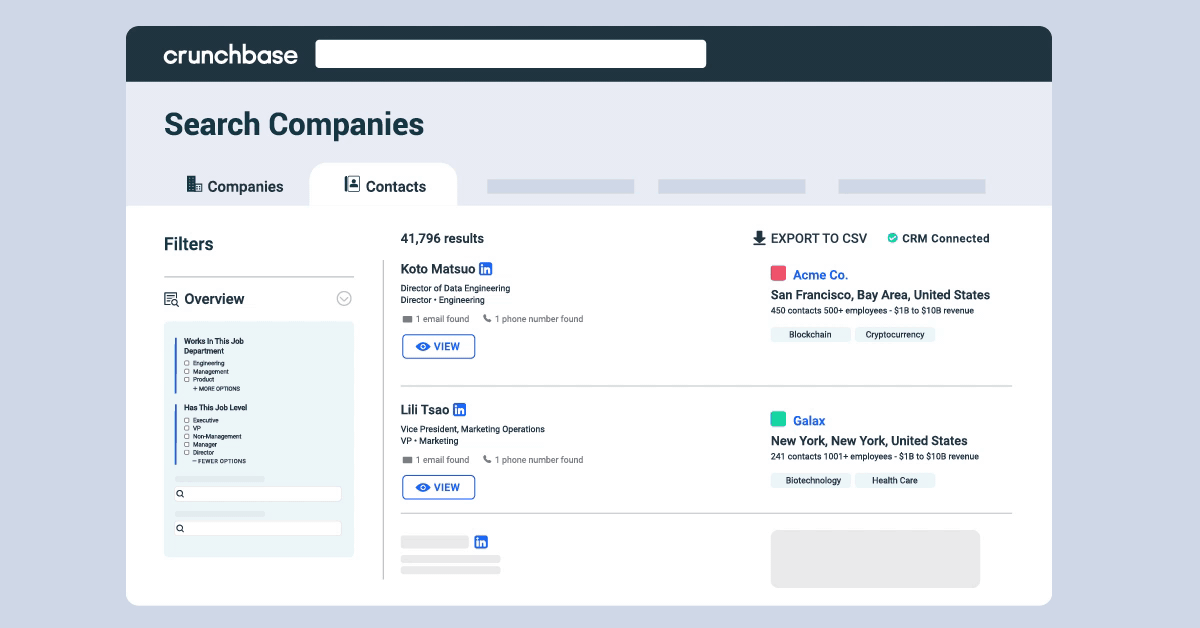The expectations of buyers are changing quickly. Prospects expect personalization at every stage of the sales cycle, which requires accurate and relevant data. That’s where sales intelligence comes in.
Sales intelligence helps sales teams use data to work more effectively by automating the prospecting process, gathering relevant insights about leads, and guiding their outreach. Ultimately, this makes it more efficient to identify, target and convert qualified accounts.
In this article, you’ll find answers to all your questions about sales intelligence, including what it is and how to use it, as well as the best sales intelligence tools.
What is sales intelligence?
Sales intelligence is the collection and analysis of data to help salespeople understand their prospects and close more deals. Sales intelligence tools gather this data, which provides actionable insights that help sales teams hit their goals.


What are sales intelligence tools?
Sales intelligence tools are software that compile data from a variety of sources to automate the sales process.
Without these tools, salespeople often end up sifting through tabs to find leads, qualify them manually and use guesswork in their outreach. If you’ve ever prospected this way, you know just how tedious it can be.
Thankfully, sales intelligence companies have created software that streamlines the entire prospecting workflow. These automated tools enable salespeople to spend less time researching and qualifying leads so they can instead focus on engaging with prospects and closing deals. They also provide salespeople with insights they may not have gotten otherwise by either bringing new leads to light or analyzing buyer intent.
Free sales prospecting guide
Get your free sales prospecting eBook when you fill out this form
Where does sales intelligence data come from?
Sales intelligence data comes from a variety of online sources, including websites and social media platforms, site usage data and browser cookies.
This data not only includes basic firmographic information, but also includes less obvious traits such as recent buy signals, hiring data, professional interests, online behavior and technology usage.
Here are some examples of the types of B2B sales intelligence data these tools collect:
Company-level data
● Headquarters location
● Company size
● Industry
● Funding stage, date of funding and total funding
● Valuation
● Revenue
● Investors
● Tech stack
Buy signals and intent data
● New company leadership hires
● New funding raised
● Recent IPOs
● Mergers and acquisitions
● Hiring activity
● Layoff activity
● Website traffic
Contact data
● Name
● Department
● Job title
● Email
● Phone number
● Social profiles10 best sales intelligence tools
- Crunchbase
- Outreach
- Dialpad
- Bombora
- Drift
- Highspot
- Gong
- HubSpot
- Salesforce
- SimilarWeb
With so much data to analyze across the web, you’ll find there are different types of sales intelligence tools that each serve a unique purpose. Some help salespeople with every stage of prospecting, while others specialize in specific actions like outreach or customer relationship management. Here are some of the top sales intelligence platforms available:
1. Crunchbase
Best for: All-in-one prospecting
Crunchbase is an all-in-one prospecting platform that uses artificial intelligence and machine learning to help you find and close deals faster. The platform offers best-in-class company data and automated prospecting features to help you discover, qualify and connect with key decision-makers at companies with buying power. Crunchbase has the power to guide you through the entire prospecting process, from identifying and recommending qualified accounts to building customized outreach emails.
Crunchbase surfaces information so quickly we don’t even have to think about going to look for it. My sales reps get immediate updates on funding rounds, acquisitions and hot companies. Crunchbase helps them drill down and see what’s happening in their territory, while also highlighting the high-priority organizations that they want to go after.
-Samuel Hall, Sales Enablement & Training Specialist, LinkSquares
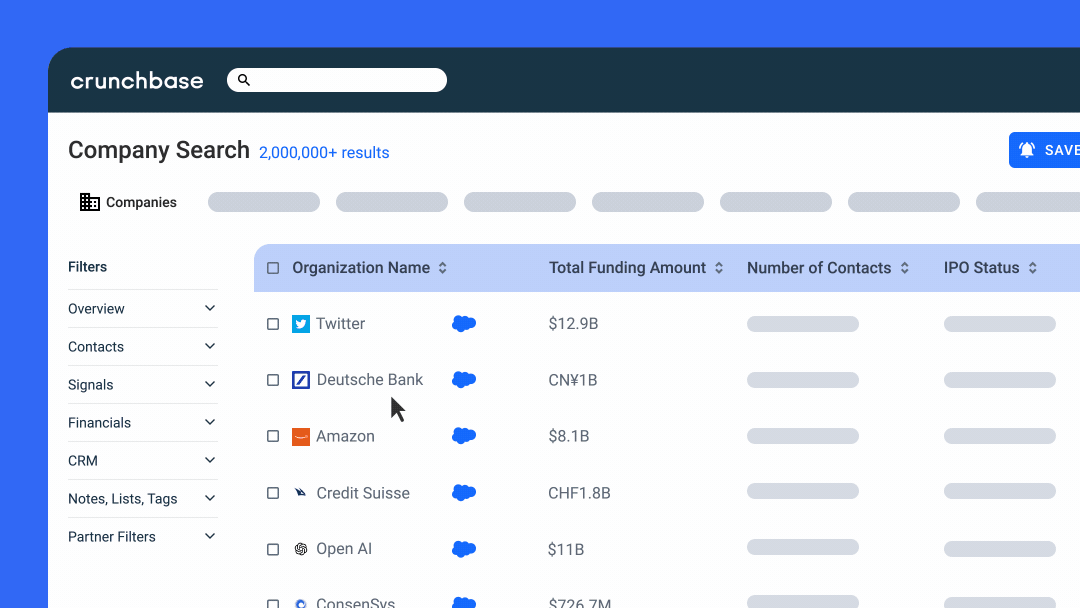

2. Outreach
Best for: Sales execution analysis
Outreach is a sales intelligence tool that helps your sales team make data-driven decisions and determine the right actions for closing deals. It analyzes B2B data to provide deal prediction scores, customer sentiment analysis and integrated A/B testing. You can use Outreach and Crunchbase together by pushing contact data in Crunchbase directly to Outreach, or assigning contacts to existing Outreach sequences.
3. Dialpad
Best for: Customer intelligence
Dialpad is AI-powered sales intelligence software that offers real-time transcription of sales calls, as well as live coaching and recommendations for reps. With built-in speech recognition and natural language processing, this tool helps sales teams learn from and optimize their outreach conversations.
4. Bombora
Best for: Buyer intent data
Bombora measures prospects’ behavior across more than 5,000 websites, showing you which products and services they’re actively researching. This gives sales and marketing teams a deeper understanding of buyer intent, enabling them to target the right prospects at the right time. Bombora data is included within Crunchbase company profiles, giving you both firmographic and intent data in a single platform.
5. Drift
Best for: Conversation intelligence
Drift is a conversational intelligence platform for sales teams. It analyzes company data to send real-time alerts when prospects engage with your brand through chat or video, and it shows which accounts are most likely to buy based on online activity and interactions. Drift also offers an AI chatbot designed to nurture qualified leads and deliver high-end service to named accounts.
6. Highspot
Best for: Sales enablement
Highspot is an AI-fueled sales enablement tool designed to improve the performance of your team. It helps you guide, train and coach reps by delivering relevant educational content and helping them craft the perfect pitch. It also breaks down customer engagement data, gives you insight into the performance of different sales plays, and analyzes buyer activity for every pitch.
7. Gong
Best for: Revenue intelligence
Gong uses AI modeling to help revenue teams better understand their interactions with customers. The sales intelligence software captures and analyzes all interactions between reps and customers, and then delivers insights that help companies make informed decisions and close deals.
8. HubSpot
Best for: CRM for small businesses
HubSpot offers free CRM software, making it an excellent choice for startups and small businesses. Its sales intelligence platform gives you a real-time view of your entire sales pipeline and offers detailed reports on sales activity, and individual as well as team performance. HubSpot also integrates with Crunchbase so you can push Crunchbase’s company and contact data to your CRM in two clicks.
9. Salesforce
Best for: Enterprise-level CRM
Salesforce offers CRM technology powered by artificial intelligence. The platform unites marketing, sales, commerce and customer service to help you effectively guide prospects through the sales funnel. Like HubSpot, the Salesforce CRM integrates with Crunchbase so your team can combine the power of both tools.
10. Similarweb
Best for: Competitor monitoring
Similarweb is sales intelligence software that offers a comprehensive view of the digital traffic of your competitors. Its online traffic and engagement data provide sales teams with full visibility into a prospect’s digital strategy and performance. This helps you discover companies that could benefit from your solution so you can adapt your sales and advertising strategy accordingly.
Account-based vs. lead-based sales intelligence tools
As you weigh the pros and cons of these sales intelligence solutions, you’ll want to consider a few key differentiators. One of the most important factors to pay attention to is whether the tool provides account-level or lead-level information. Let’s break down the differences:
- Lead-based tools gather information about individual contacts rather than companies. While it’s great to get a list of names, job titles and contact details, these lists won’t show you whether the lead’s company is ready to buy. As a result, you’ll have to backtrack, guessing and checking each lead to find out whether their company has the need and resources to buy your product.
- Account-based tools, on the other hand, help you find higher-quality leads by directing you to relevant companies first. You can use these platforms to conduct granular searches of the companies within your target market — whether they’re within a particular industry or at a certain funding stage — and then find the people to contact at those companies. This way, you’re only spending time on accounts that match your ideal customer profile, optimizing your chances of closing the deal.
Crunchbase is an account-based sales intelligence tool that makes it easy to identify companies that match your ideal customer profile and connect with the right decision-makers.
Who should use sales intelligence?
While automated sales intelligence improves the job function of everyone in sales, sales development representatives, business development representatives and account executives see the biggest impact. These sales team members conduct the initial research on leads, qualify those leads as prospects and then reach out to book meetings and demos — processes that become faster and more effective with these tools.
How does sales intelligence help you close more deals?
No matter your role on the sales team, sales intelligence tools can help you prospect more efficiently and grow your revenue. Here’s how sales intelligence helps your business:
1. Easily find qualified accounts
A powerful sales intelligence platform will draw from company data across the web and let you conduct filtered searches based on your preferred criteria, whether it’s company size, location, last funding date or recent leadership hires. This lets you surface companies that fit your ideal customer profile, ensuring you’re prioritizing the ones most likely to buy.
Pro Tip: Use Crunchbase’s advanced search filters to quickly identify good-fit accounts, assess company health and get actionable data about your prospects.
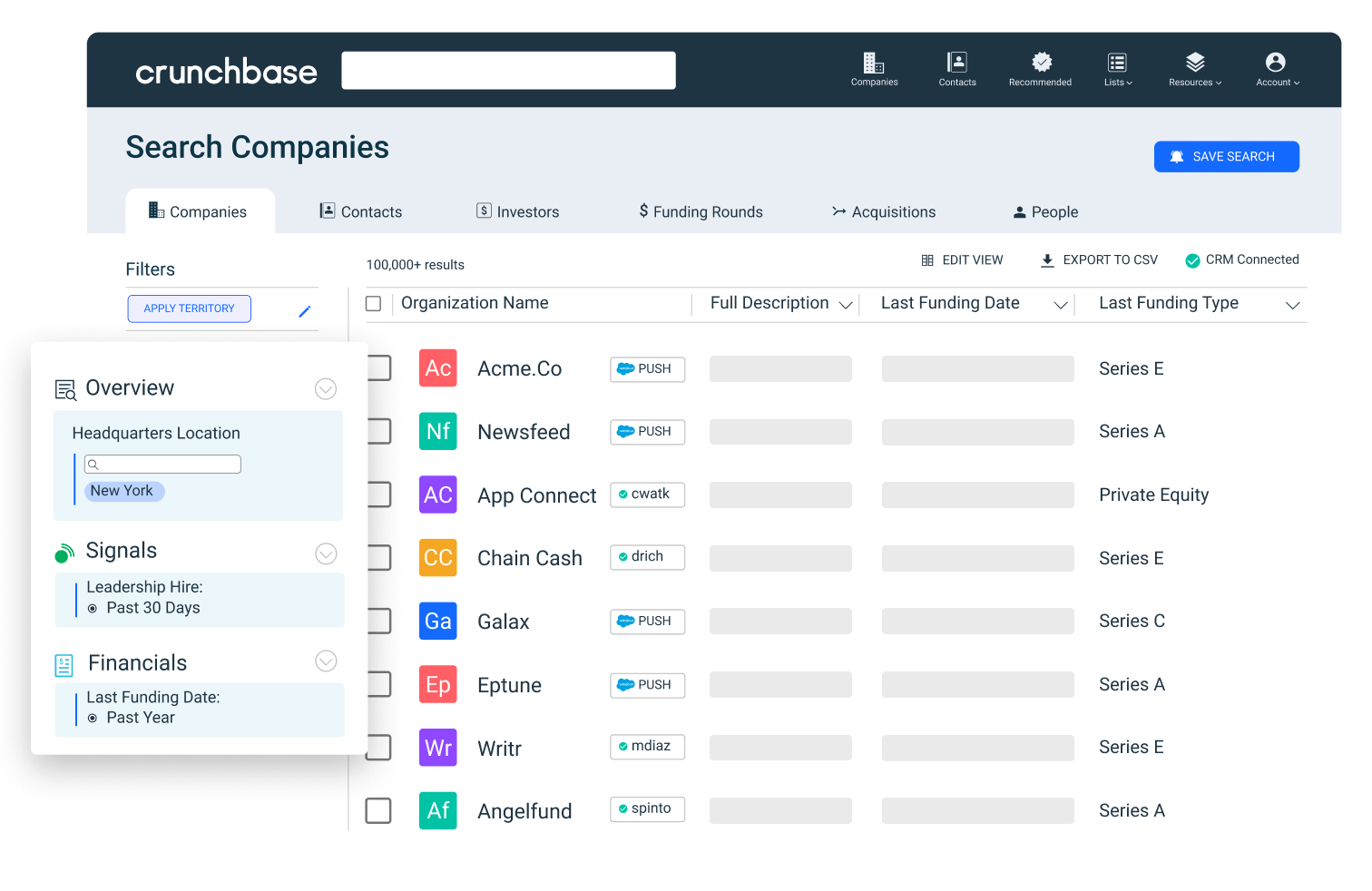

2. Generate new leads automatically
Sales intelligence can further grow your revenue by pointing you toward companies you may not have discovered otherwise. A smart solution will automatically comb the web for companies that fit your criteria, preventing good-fit accounts from falling through the cracks. This is a huge advantage over manual search, since it saves your team time and reduces your chances of missing out on new leads.
Pro Tip: Automate account discovery with Crunchbase’s recommendations feature. With best-in-class company data and a powerful machine-learning recommendation engine, Crunchbase does the hard work of digging up leads so you don’t have to.
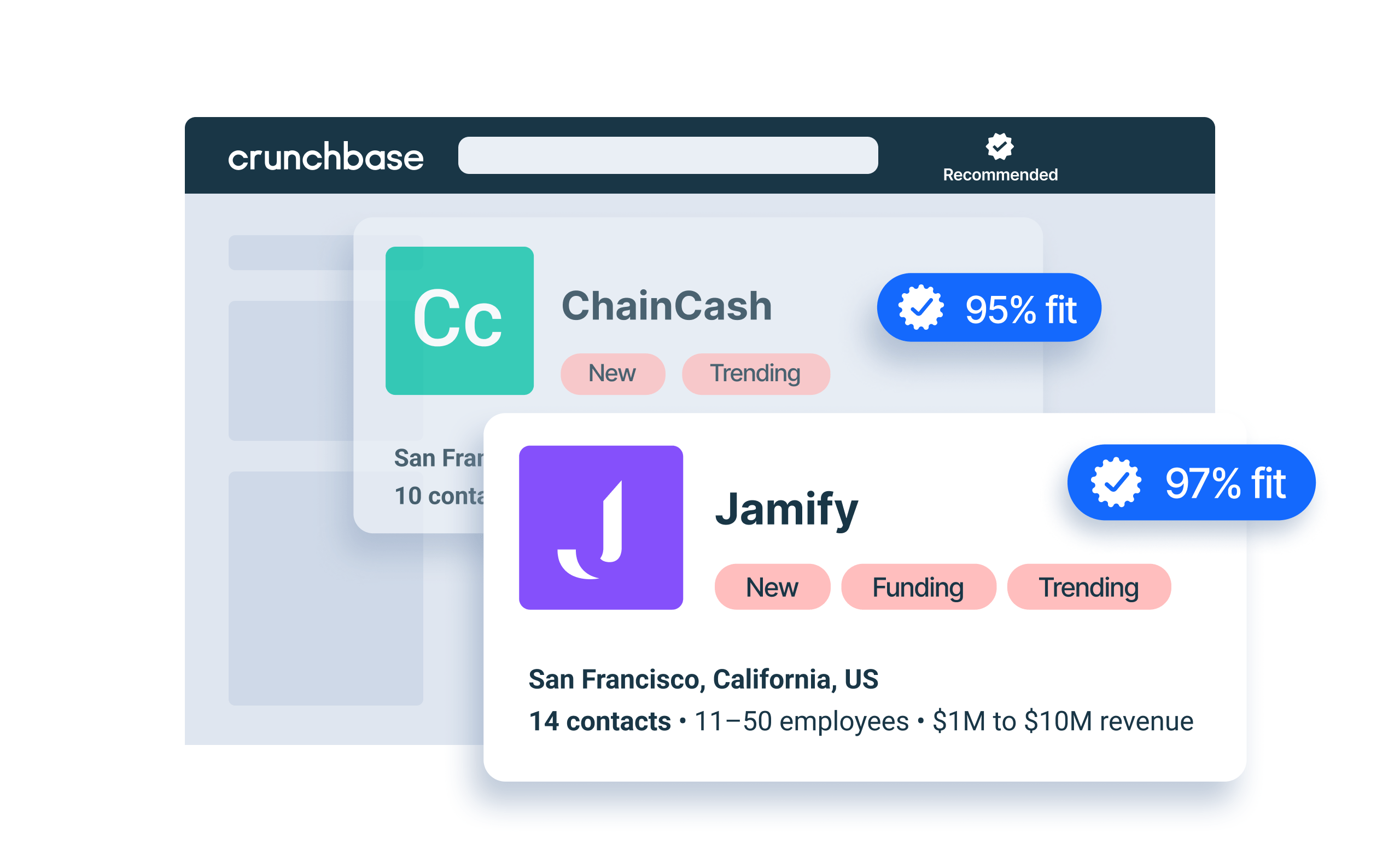

3. Streamline your tech stack
A bigger tech stack isn’t just more expensive; it also means more wasted time. Sales intelligence solves this problem by consolidating information and syncing data between platforms. When you’re empowered to prospect from just one or two platforms, you can stop wasting time copying and pasting the data and bouncing back and forth between tabs.
Pro Tip: Quickly populate your Salesforce or HubSpot CRM with best-in-class company data by integrating them with Crunchbase. This lets you push the data straight from Crunchbase to your CRM in just two clicks.
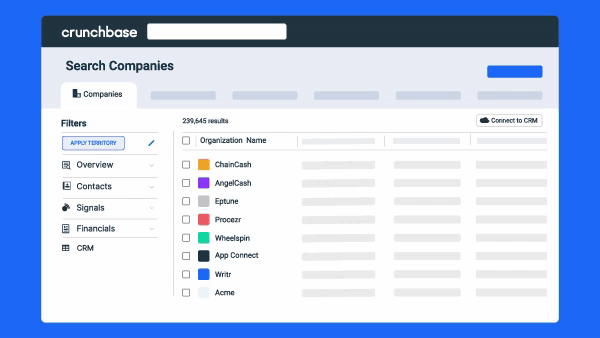

4. Track company buy signals
Sales intelligence helps you close deals by sending you buy signal alerts so you can reach out at exactly the right time.
Buy signals, also known as trigger events, are indications that a company has the resources to purchase your product. These include events like when a company raises funding, hires a new executive or goes public. The sooner you reach out to companies after these trigger events, the higher your chances of grabbing their attention before your competitors do. Sales intelligence tools can identify these events in real-time and notify you right away — enabling you to close bigger and better deals.
Pro Tip: Set buy signal alerts for the companies you care about with Crunchbase. Crunchbase will notify you as soon as buy signals happen so you can act on them in real-time.
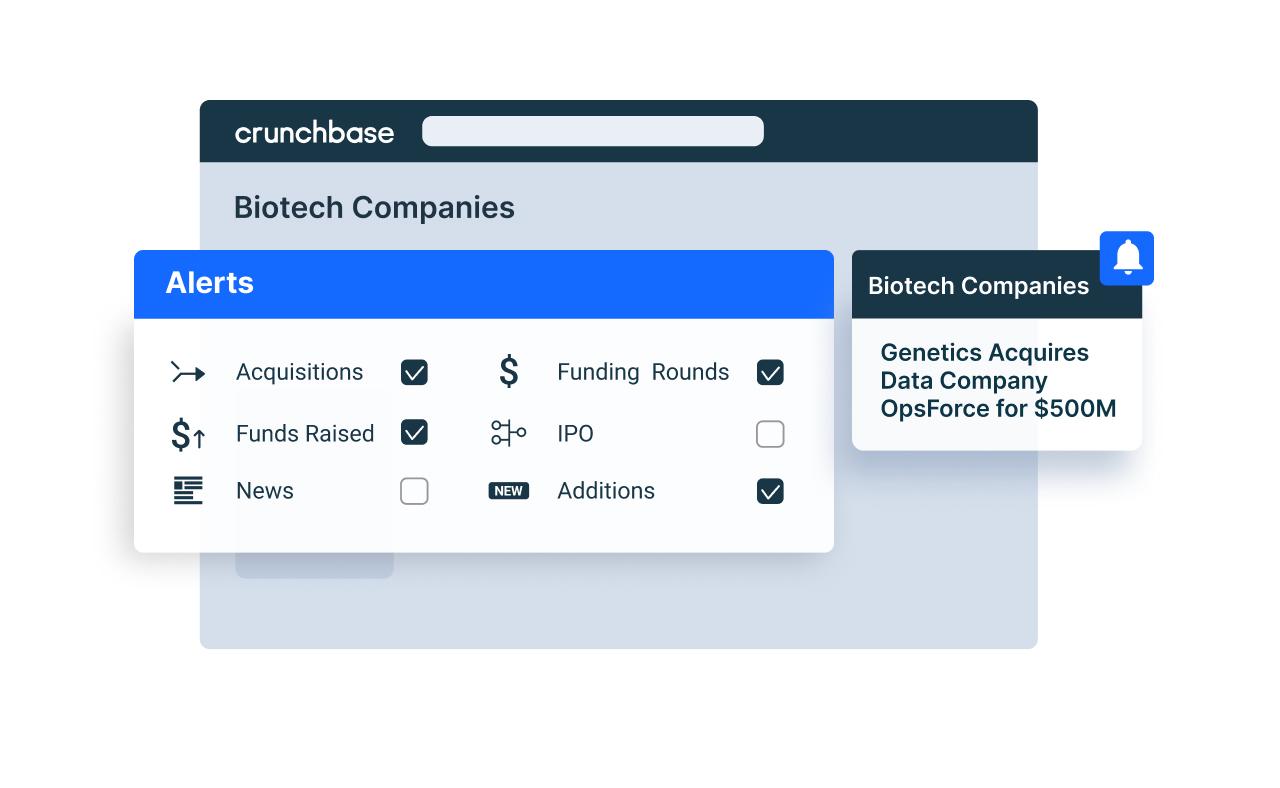

5. Find and engage with decision-makers
Just as sales intelligence helps you find the right companies, it also helps you uncover strategic contacts at those companies. Sales data tools gather details like employee name, job title, industry, email address and phone number — information that is often unavailable or inaccurate across the web. They also show you whether or not the contact is someone with decision-making power at their company, maximizing your chances of building a strategic connection and closing the deal.
Pro Tip: Once you’ve discovered your target companies with an account-based approach, use Crunchbase to see verified contact data for the key decision-makers at those companies. Then, send them personalized messages using Crunchbase’s automated, intelligent email templates.
